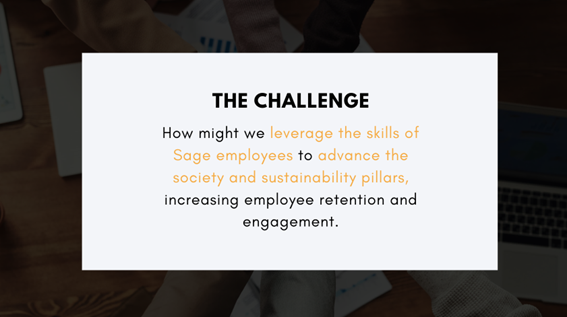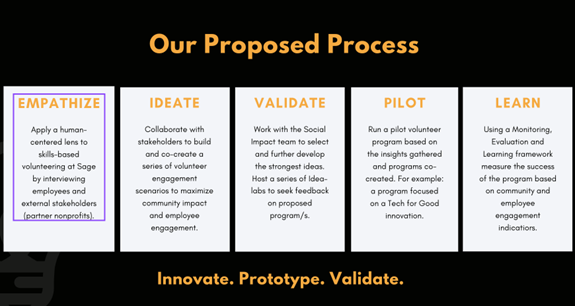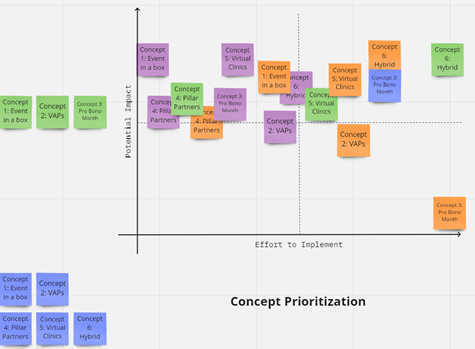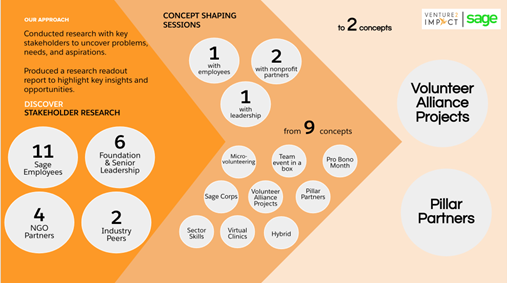Fanny Laguna, Foundation Manager for North America
Sage Foundation
Fadi Al Qassar, Co-Founder and Executive Director
Venture 2 Impact
Earlier this year, Sage took on a brand new initiative with Venture 2 Impact, a non-profit that uses a human-centered design approach to increase digital resilience and advance gender equity in global communities. V2I helped us to create company-sponsored skills-based volunteer programs that would link our expert employees with global communities who could leverage their skills. This was something our team wanted to operationalize for a while, but I had some questions and concerns that were holding me back.
Some of my most burning questions (which may be some of yours too) were:
- How do I increase employee engagement in philanthropic activities?
- How do we get more of our colleagues involved in skills-based volunteering?
- How do we convince our colleagues their skills could be invaluable to non-profits?
- How do I do this in the most time-efficient way?
These questions kept coming back to me in 2021. Then, I met Fadi Al Qassar, Executive Director of Venture 2 Impact, at the 2021 ACCP Conference. Collaborating with him and his team has been great from the start.
We began our partnership with a clear and intentional journey focused on putting the employee experience, their desires for volunteering, and their reservations concerning skills-based volunteering, at the center of our approach.
Informed by a series of discovery conversations between the Sage and Venture 2 Impact teams, we were able to craft a common challenge statement for the project along with a proposed Human Centered Design approach to resolve the challenge. This was important to us because Human Centered Design is a problem-solving technique that puts real people at the center of our initiative, enabling us to create products and services that resonate and are tailored to the needs of those we wish to help.


Once the process was defined, the team at Venture 2 Impact began by conducting ethnographic interviews with various Sage Foundation stakeholders. We consulted with a diverse array of Sage employees and non-profits through individual interviews and concept-building sessions. This helped us ensure that the final concept was informed by stakeholder needs and addressed any potential issues identified.
Venture 2 Impact analyzed the insights from Sage employees to determine essential design criteria for the new skills-based volunteering program. With these criteria in mind, they developed nine potential concepts. The six most promising concepts were then iterated during an interactive brainstorming session and a concept shaping workshop. Trigger questions were also used to tease out any misgivings, unseen potential, or gaps in the process.

The two final concepts were further analyzed and iterated during a design lab with Sage employees. This gave us more insights and ideas for improving the concepts.

As we reflected on the human-centered approach of the project, two main concepts came to mind:
- Collaboration: It is crucial to have a variety of Sage employees with various levels of responsibility within the company and engagement in volunteer activities, sharing ideas about what would and would not work.
- Trust: We learned to trust the process. Using a human-centered design approach means you do not know what the result will be ahead of time. It is about asking the right questions to our stakeholders (employees, leadership, and partner nonprofits), allowing the data to indicate where the opportunities are, and creating intentional micro-programming to assess our hypothesis.
To increase employee engagement in volunteer programming, we recommend you consider using a Human-Centered Design approach to shape your offering. Remember that this approach will only work if you are willing to try new things to achieve your desired results. Based on our experience at Sage, we recommend using a third party like Venture 2 Impact, who has some experience with this approach to help you implement it in your organization.
Sage and Venture 2 Impact will lead an in-person Design Lab at the 2022 ACCP Conference to help attendees leverage design thinking to engage their colleagues in designing and implementing volunteer programs. Join us for this interactive session to take your volunteering efforts & impact to the next level without increasing your investment.

